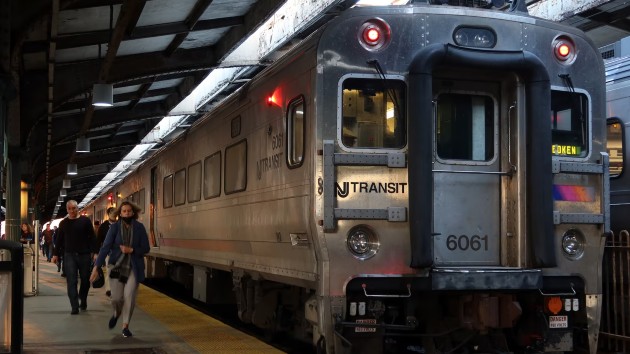
(NEW JERSEY) — New Jersey Transit train engineers have officially commenced their strike, shutting down commuter trains and leaving hundreds of thousands of commuters scrambling to find other modes of transportation.
Members of the Brotherhood of Locomotive Engineers and Trainmen (BLET) union had been threatening to go on strike unless NJ Transit officials and the union were able to agree on new contract terms and conditions for the workers who drive the trains.
A deal was close but not reached, according to New Jersey Gov. Phil Murphy, resulting in all New Jersey Transit commuter trains and the MTA Metro-North West of Hudson service to stop running when the strike began at 12:01 a.m. on Friday.
On Thursday, both sides met again for 11th-hour negotiations to avert the strike, in addition to a meeting in Washington, D.C. Monday with the National Mediation Board, but no resolution was reached.
During a press conference late Thursday evening, Murphy and NJ Transit CEO Kris Kolluri encouraged commuters to work from home on Friday.
“If you can work from home, certainly tomorrow, and you’re out there watching that would be a really good day to do so,” Murphy said.
Kolluri said Thursday evening there was an imminently achievable deal and negotiations weren’t a “lost cause.” They are expected to resume negotiations on Sunday morning, according to Kolluri.
After a New Jersey Transit board meeting on Wednesday, Kolluri told reporters he was “confident and optimistic” about their efforts to avert a strike.
“I am going to stay at the negotiating table as long as it takes,” Kolluri said. “If it takes two to tango, I think if we can all focus on the task at hand, which is to get a fair and affordable agreement, I think we can avert a strike.”
BLET National President Mark Wallace said during a press conference on May 9 that it’s been five years since train engineers working for NJ Transit have received a pay increase.
“Reasonable people would vote for an agreement that is fair,” Wallace said.
Tom Haas, the general chairman for BLET, said during the same news conference that engineers working for NJ Transit earn an average salary of $113,000 a year. If New Jersey Transit CEO Kris Kolluri agrees to an average salary of $170,000 a year for engineer operators, then “we got a deal,” Haas said.
“NJ TRANSIT locomotive engineers already have average total earnings of $135,000 annually, with the highest earners exceeding $200,000,” according to a statement on the New Jersey Transit website regarding negotiations with the BLET.
During a separate press conference on May 9, Kolluri responded to the union’s arguments, saying Haas previously agreed to a wage increase to $49.82 an hour but then later demanded even higher wages because he thought there was a “better pot at the end of the rainbow.”
“I cannot keep giving money left and right to solve a problem. It all comes down to, who is going to pay for this? Money does not grow on trees,” Kolluri said.
ABC News requests sent to NJ Transit and the BLET for comment regarding Wallace, Haas and Kolluri’s statements concerning pay increase claims did not receive a response.
NJ Transit states that if they were to accept BLET’s terms, it would cost both them and New Jersey taxpayers $1.363 billion between July 2025 and June 2030. Additionally, if BLET chooses to strike, the taxpayer cost of providing a limited alternative service via buses would be $4 million per day, NJ Transit claims.
NJ Transit officials have said the strike would “disrupt the lives of more than 350,000 commuters” and developed a contingency plan that includes adding “very limited capacity to existing New York commuter bus routes in close proximity to rail stations and contracting with private carriers to operate bus service” for commuters that typically rely on the trains.
But even with the expanded bus service, NJ Transit said that it “estimates that it can only carry approximately 20% of current rail customers” because the bus system doesn’t have the capacity to replace commuter rail service.
Xuan Sharon Di, associate professor of civil engineering and engineering mechanics at Columbia University, told ABC News before the strike began that it could be a “disaster” for the traffic in Manhattan due to the increased bus and car traffic into the city from commuters unable to take the train. There also will be the added penalty of commuters into Manhattan having to pay recently enacted congestion pricing.
“New Jersey Transit is the backbone for people who live in New Jersey to move around. This is actually shocking to me,” Di told ABC News of the prospect of a strike.
Steven Chien, civil and environmental engineering professor at the New Jersey Institute of Technology, said many of his colleagues use NJ Transit to commute and that a strike will “paralyze vital transportation arteries in our regions.”
Copyright © 2025, ABC Audio. All rights reserved.
